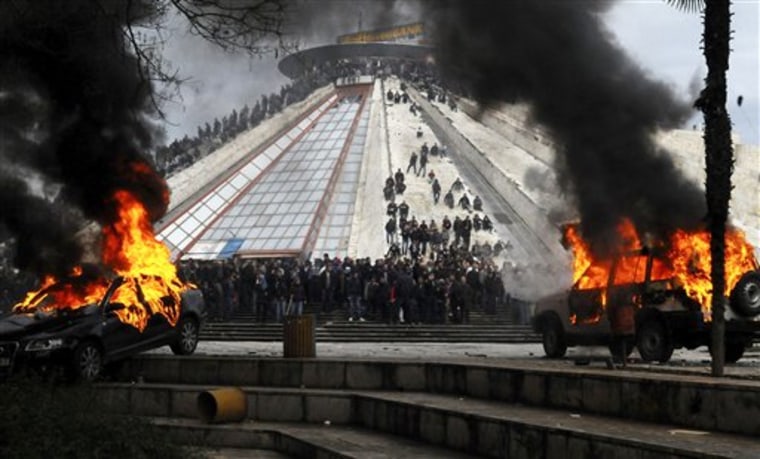Thousands of people held an anti-government demonstration in Albania's capital on Friday, and at least three people were killed and scores wounded as police using tear gas, rubber bullets and water cannons clashed with the protesters.
At least 15 police vehicles were overturned and burned by the more than 20,000 people who took part in the largest and most violent protest that Tirana had seen in years.
"Get Out! Get Out!" the demonstrators shouted as they battled the riot police outside Conservative Prime Minister Sali Berisha's office in the capital. Other protesters carried red-and-black Albanian flags.
Berisha accused the opposition Socialists, who called the protest, of trying to overthrow the government with a "Tunisian-style" demonstration — referring to the rioting that just toppled Tunisia's government.
Berisha, who said he was at his office when the protest erupted, rejected opposition demands for early elections. He also alleged that the demonstrators included "gangs of criminals, bandits, traffickers and terrorists."
Hundreds of riot police and national guard officers swept through the center of the capital, beating protesters with batons and detaining dozens of youths. By Friday night, most of the demonstrators had left the city's main boulevard.
Health officials said at least three people were shot and killed, and authorities said more than 130 police and demonstrators were injured.
Tensions have been mounting for months between Albania's government and the Socialists, and they rose sharply this week when the country's deputy prime minister, Ilir Meta, resigned amid an alleged corruption scandal.
The United States and the European Union both appealed for calm in Albania.
"We deplore that today's event has spiraled into violence. We urgently appeal to all political forces to call for calm and refrain from provocation," an EU said in a statement.
In Washington, State Department spokesman P.J. Crowley urged Albanian politicians to tone down their inflammatory rhetoric.
"We condemn the violence today in Albania," he said. "The use of provocative rhetoric and the suggestion or tolerance of any form of violence is a deep disservice to the people Albania. They deserve better."
Neighboring Greece also expressed concern, describing the deadly protests as a "blow to democracy."
Albania is one of Europe's poorest countries. For nearly 50 years, the mountainous country of 3.2 million people was ruled by xenophobic Communists who banned contact with the outside world. That regime was toppled in a student-led revolt in 1990.
The nation descended into chaos seven years later following the collapse of popular investment schemes, requiring an international military mission to restore order.
Albania is now a NATO member and seeks to join the 27-nation EU, but corruption is believed to be widespread and unemployment is high.
The corruption scandal began after a private TV station aired a video allegedly showing Meta asking a colleague to influence the awarding of a contract to build a power station.
The Socialists also have accused Berisha's conservative Democratic Party of rigging Albania's 2009 election, which it won by a narrow margin.
The next election is scheduled in 2013.
But opposition leader Edi Rama said the public may not be willing to wait.
"We shall continue our struggle in a determined way because the way out is clear: either a free Albania for all, or keep the people subdued under the boot of barbaric power," he said.
"The world should see, the community of democratic countries should see, Europe should see, everyone should see what is happening."
Referring Friday's fatalities, he said: They protested "for a better Albania and lost their lives for an Albania we are forced to live with but that we shall definitely change."
